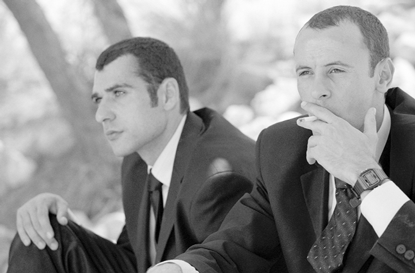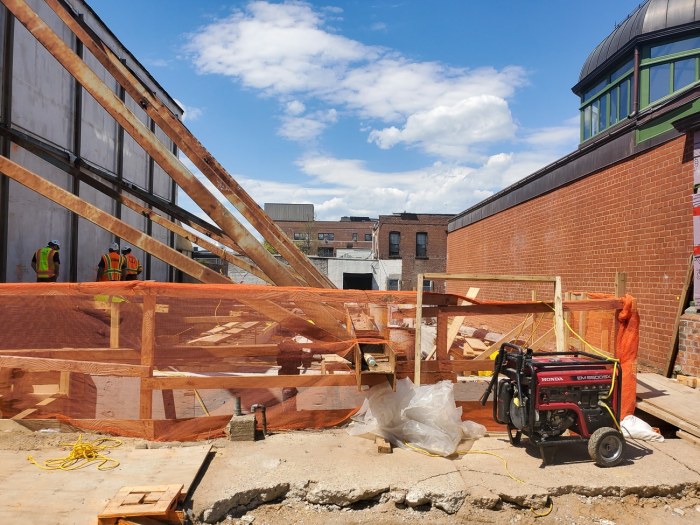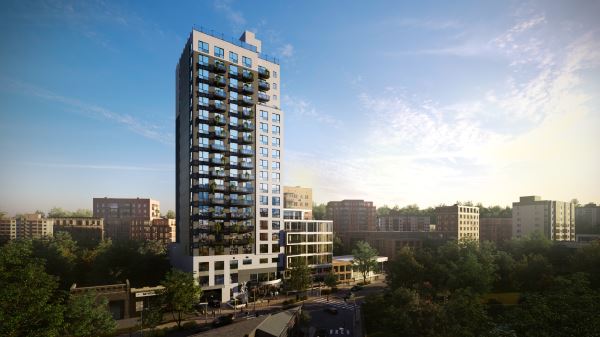Film takes on explosive subject tepidly, but with commendable humanism
The act of suicide turns a person’s life into a giant question mark. For suicide bombers, it’s doubly true. Rightly or wrongly, everything in their life is seen as a prelude to an act that is an unimaginable choice to middle-class Westerners. This makes the suicide bomber a difficult character to fictionalize. Portrayed too sympathetically, one risks making excuses for him. On the other hand, there’s little point in demonizing someone so desperate or angry that he’s willing to give up his life and take those of others to make a political statement. The act guarantees him the identity of inexplicable Other.
Terrorism as a subject in general is filled with traps, both political and aesthetic.
Palestinian-born, Dutch-based director Hany Abu-Assad is certainly aware of these pitfalls. In fact, he may be too conscious of them. “Paradise Now” is a tepid film about an explosive subject. It begins in the West Bank city of Nablus. Close friends since childhood, Said (Kais Nashef) and Khaled (Ali Suliman) work as auto mechanics. Said gets fired after damaging a customer’s car during an argument. However, his job also gave him the opportunity to meet Suha (Lubna Azabal), a beautiful woman whose father was a well-known suicide bomber. He’s approached by Jamal (Amer Hlehel), who asks him and Khaled to carry out a suicide bombing in Tel Aviv. The two men agree, although Said goes out in the middle of the night to see Suha again.
The next day, their hair is cut, their beards shaved, and their bodies washed. After waving guns and making angry speeches for the benefit of a video camera, they don suits—it’s a running joke that no one believes an Arab man in a suit could be headed anywhere other than a wedding—and prepare to head out and meet a driver who will take them to Tel Aviv. However, things don’t go according to plan and the two men are separated.
Abu-Assad chose to shoot in 35mm—when digital video would be far cheaper and easier to use in dangerous locations—to distinguish his film from news footage. Seemingly influenced by ‘90s Iranian cinema (particularly Jafar Panahi’s “The Mirror”), his 2002 film “Ford Transit” mixed documentary and fiction in ways that are hard to precisely disentangle. Panahi’s shadow hangs over some of “Paradise Now” as well, particularly once Khaled starts searching for Said. Abu-Assad could make an excellent thriller if that were his main goal. The final half of “Paradise Now” is tense and suspenseful. However, he’s aiming for something a lot more ambitious.
Even if it works as a thriller, “Paradise Now” becomes increasingly problematic as a political film. Ultimately, it does try to answer the question of “Why do suicide bombers do it?” Its explanation is a bit reductive and sets ideology on the back burner, giving Said’s unhappy personal history as much weight as his hatred of the Israeli occupation.
Much of its awkwardness stems from the script, which was co-written by Abu-Assad and producer Bero Beyer. Said delivers a lengthy speech about how his life has been crippled by the Israeli occupation. While the scene is powerful, it’s an opportunity for Abu-Assad to jump on the soapbox.
The film opens with Suha, although it quickly shifts focus to Said and Khaled. A principled secular radical who works with a human rights group and denounces violence, Suha comes across more like a mouthpiece for the director’s own views than a real woman. When Said comes to see her at four a.m. with the excuse of returning her car keys, she welcomes him in and starts a conversation about cinema, rather than telling him to get lost and going back to sleep. Much of her dialogue exists only to counter the suicide bombers’ perspectives.
Throughout, Abu-Assad seems deathly afraid of creating any image that could be misinterpreted, although right-wing Israelis and their sympathizers would probably detest this film simply for existing. He’s far from the only Palestinian filmmaker—his compatriots include Elia Suleiman and Michel Khleifi—but he’s the first to be distributed by a division of Time Warner. Therefore, “Paradise Now” is likely to reach a wider American audience than Suleiman’s “Chronicle of a Disappearance” and “Divine Intervention” or Khleifi’s “Wedding in Galilee.” Suleiman, in particular, is a more talented director who finds parallels to the Palestinian dilemma—exemplified by the mute protagonists he plays in both films—in the comedy of Buster Keaton and Jacques Tati. Unlike Abu-Assad, he’s willing to offend his audience.
In view of his Suleiman’s films, “Paradise Now” feels rather weak, but compared to most American media discourse about terrorism—Joseph Castelo’s “The War Within,” released last month being a major exception—its humanism looks practically revolutionary. The final image is a tight zoom into Said’s eyes. To the film’s credit, these sad orbs still have the power to move the audience, even as one dreads what they may be about to do.
gaycitynews.com


































